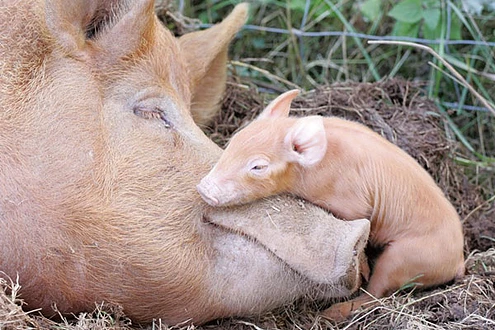New to Industrial Farming? Check out our “Introduction Post.”
All caught up? Read on…
On April 26, jurors awarded 10 citizens living near a 15,000-head swine operation $750,000 in compensatory damages and hit Smithfield Foods, which owns the animals, with $50 million in punitive damages. This was the first trial of a suit filed by about 500 citizens living near these huge feeding operations that manage liquefied animal waste by storing it in large ‘lagoons’ and then spraying it on nearby fields when it reaches a certain level. Rural residents, mostly low-income minorities living near these operations, have complained for decades about the stench and its fallout, including decreasing property values, health issues, and significant impacts to their quality-of-life. But the legislature refused to impose regulations on the politically powerful industry backed by influential lobbies.
The industry has for years tried to frame the effort to require enhanced waste-management practices as an attack on family farmers. In reality, these efforts, and these lawsuits, do not target farmers; they target Smithfield – the multi-billion dollar corporation that dictates how farmers operate the facilities through strict contracts. (Smithfield Foods, Inc., is now a wholly-owned subsidiary of WH Group of China, which purchased it in 2013 for $4.72 billion in the largest Chinese acquisition of an American company to date.)
Still, Keira Lombardo, senior vice president of corporate affairs for Smithfield Foods, said “These lawsuits are an outrageous attack on animal agriculture, rural North Carolina and thousands of independent family farmers who own and operate contract farms. These farmers are apparently not safe from attack even if they fully comply with all federal, state and local laws and regulations.” Smithfield plans to appeal.
Even if these citizens win, NC legislation passed last year sets a limit on damages that can be recovered in future ‘nuisance’ cases like these for the quarter of a million people living within a mile of a factory farm. HB467 will prevent plaintiffs from seeking any damages relating to illness, lost-income, pain and suffering, or a diminished quality-of-life. They will be limited to seek damages solely related to their severely diminished property values.
Take Action: Contact your legislator and ask them to overturn HC467.


Please list the elected officials who supported HB467.
Some may be running for election and informed voters have options.
Thank you
Thanks so much for your comment, Bob. Clean Water Matters is a initiative supported by Cape Fear River Watch – a 501c3 organization that does not support or oppose political candidates. The NC General Assembly lists voting records for all legislative actions on their website: https://www.ncleg.net/gascripts/BillLookUp/BillLookUp.pl?Session=2017&BillID=H467.
Rouzer is definitely supporting the bill.
Thanks for your interest in this important issue, Deborah! This bill was put forth by the NC General Assembly, so U.S. Rep. Rouzer was not part of the vote. You can see the roll call of votes cast at https://www.ncleg.net/gascripts/voteHistory/RollCallVoteTranscript.pl?sSession=2017&sChamber=H&RCS=472.
You can provide the facts without being political. Knowing who dupports these destructive bills could go a long way towards the coal of clean water for all, but not everyone has the time to do the research or keep track of which bill did what.
Still, thanks for the work you do!